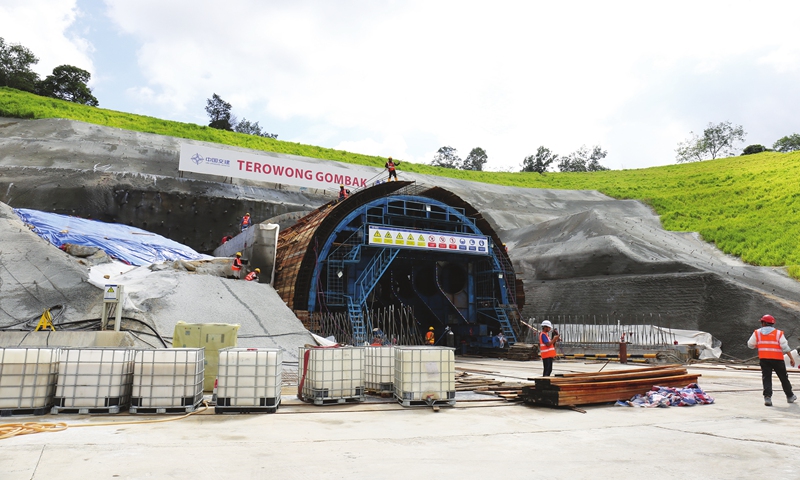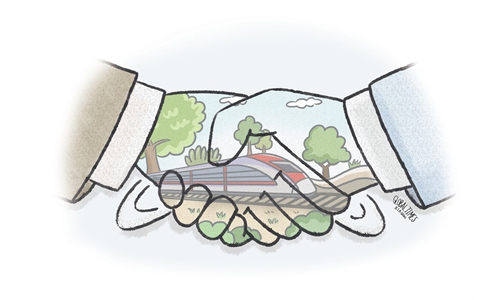BRI turns vision into action: white paper
Initiative has created a new paradigm for international cooperation: official

The construction site of BRI flagship project,665-kilometer-long East Coast Rail Link in Malaysia Photo: Zhao Juecheng/GT
China has issued a white paper on the Belt and Road Initiative (BRI) on Tuesday, highlighting the role that the iconic "project of the century" has played in global development during the past decade as well as its achievements in living up to its ultimate goal of building a global community of shared future.
The white paper was released at an important juncture that is deemed as both a milestone and a new start of BRI cooperation, after Chinese President Xi Jinping proposed the grand initiative 10 years ago. It was also issued ahead of the third Belt and Road Forum for International Cooperation (BRF) to be held this month, which analysts believe would serve as a testimony debunking stepped-up Western slandering, while uniting more consensuses on the initiative's future development blueprint.
The momentum development of BRI has unfolded an unprecedented chapter of global growth, illustrating a path to global connectivity, peace and prosperity that prompts the China-proposed initiative to become the world's largest platform for international cooperation with the broadest coverage in the past 10 years, the white paper showed.
At a time when the economic globalization agenda appears to be overshadowed by certain countries' ill-intended push for "de-risking" and camp confrontation, Chinese and foreign observers pointed out that the BRI - which fundamentally differs from the Western cold war and zero-sum game mindset - is growing in importance.
The initiative has been spearheading in erecting a new multipolar global order in which the interests of every participant are equally represented rather than "a small Western hegemonic clique" predominating, they said, predicting the mega project will play a more prominent role in bridging differences and promoting cooperation in the face of future unprecedented challenges.
A new global landscape
The white paper entitled "Belt and Road Initiative: A Key Pillar of the Global Community of Shared Future" expounded on the background against which BRI was launched, which it said is in response "to a changing global situation and the expectations of the international community."
"It is no longer acceptable that only a few countries dominate world economic development, control economic rules, and enjoy development fruits," the white paper said. As such, the BRI has contributed new ideas and new approaches to international exchanges, and produced a fairer and more equitable global governance system that takes humanity to a better future.
"Since the BRI was launched, building a community with shared future has turned from a concept into action, and a vision into reality. More and more countries comprehend what China says that development is an inalienable right of all countries, not a privilege of just a few Western countries," Maya Majueran, director of Belt and Road Initiative Sri Lanka (BRISL), a Sri Lanka-based organization that specializes in BRI cooperation, told the Global Times on Tuesday.
"The current world is unfair and disproportionate … as the US and its Western allies often coerce or abuse their power to maintain their hegemonic positions," Majueran said, adding that countries, especially those from the Global South, wanted to see that the future of humanity should be in the hands of all countries, international rules should be written together by all, and development benefits should be shared by all.
Levente Horvath, former consul general of Hungary in Shanghai, told the Global Times that the EU and the US seem to view BRI cooperation, which leads to win-win results, differently because they often approach everything as a zero-sum game.
But BRI collaboration with China appears to offer more promising prospects, as China is "open to engaging with other countries without seeking dominance or control over their internal policies, unlike some Western nations," he said.
The publication of the white paper held more special significance in light of the current toxic geopolitical environment, under which Western politicians and media outlets have been sparing no efforts to vilify the BRI.
"It is important that we clarify the origins and development of the BRI, its implementation principles, and how it serves humanity and lead to the construction of a community with shared future. It will put [the new round of] Western smearing campaign in vain," He Weiwen, a senior fellow and executive council member of China Association of International Trade, told the Global Times on Tuesday.
In response to a question concerning competition from similar infrastructure initiatives by other countries, Li Kexin, Director-General of the Department of International Economic Affairs of China's Foreign Ministry, said at a news conference on Tuesday that China welcomes all parties to scale up inputs on basic infrastructure in developing countries, and is willing to cooperate with all parties on the basis of openness, inclusiveness, equal footing and mutual benefits, to provide more high quality international public goods.
In a sharp divergence to China's open and inclusive attitude, the US and its Western allies have been in a race to roll out infrastructure initiatives to "counter" BRI, out of geopolitical calculation.
Chinese wisdom
It is also expected that based on the comprehensive picture provided by the white paper, participants of the upcoming BRF - standing at the 10th anniversary of the BRI - could discuss and draw out a new course for its development in the next decade.
Representatives from 130 countries and 30 international organizations will participate in this year's forum, according to Li.
"The past 10 years marked just the beginning of the BRI cooperation. The future will be even brighter in the next decade and beyond," Liang Haiming, dean of Hainan University Belt and Road Research Institute, told the Global Times on Tuesday..
As a large and developing country that meets its responsibilities, China will continue to promote the BRI as its overarching plan and its top-level design for opening-up and win-win international cooperation, the white paper said. That means China will help more developing countries to accelerate regional integration and embed themselves in the global supply chain, so as to share the dividends of global economic growth, Liang explained.
In addition to infrastructure, another focal point of BRI cooperation is to expand "third-party market cooperation," especially with Europe and other Western countries, which will break the traditional model and create a new paradigm for global cooperation between the developed and developing world, Liang said.
Under the international economic situation, the model also resonates with the development demands of countries and regions at different stages of growth, he noted.
The white paper offers a detailed glimpse into the decade achievement of BRI. One among which is the promotion of all-rounded connectivity in multiple fields including policy coordination, infrastructure connectivity, unimpeded trade, financial integration, and closer people-to-people ties.
From 2013 to 2022, China's trade with BRI participating countries reached $19.1 trillion, with an average annual growth rate of 6.4 percent. The cumulative two-way investment between China and partner countries reached $380 billion, including $240 billion from China, the white paper showed.
During the press conference on Tuesday, vice commerce minister Guo Tingting also took note of a number of flagship BRI projects, including China-Laos Railway, Jakarta-Bundung High-speed Railway as well as Mombasa-Nairobi Standard Gauge Railway.
Those projects are part of a grand overarching transport network being built up under BRI which some foreign observers hailed as a "game changer" for different continents.
"For the first time in history, an unprecedented plan for the formation and development of an interconnected transportation infrastructure across the entire Eurasian continent was presented. Its implementation truly opened up broad prospects for the creation of a fundamentally new transport configuration across the vast expanse of our planet," Saidmukhtar Saidkasimov, former Uzbek deputy prime minister and former minister of Foreign Affairs of Uzbekistan, told the Global Times.
Liang said the BRI has made great contribution in sharing China's development model and experience with other participating nations. One of such wisdom is epitomized in building infrastructure, as a popular Chinese saying goes "if you want to get rich, build roads first."
"The BRI connects the past, the present and the future. This initiative was launched by China, but it belongs to the world and benefits the whole of humanity," reads the white paper.


